Source: Ukraine May Need to Import/Seek Humanitarian Commodity Supplies Ahead

GAO report: Departments need to improve job of measuring progress to spur SAF production
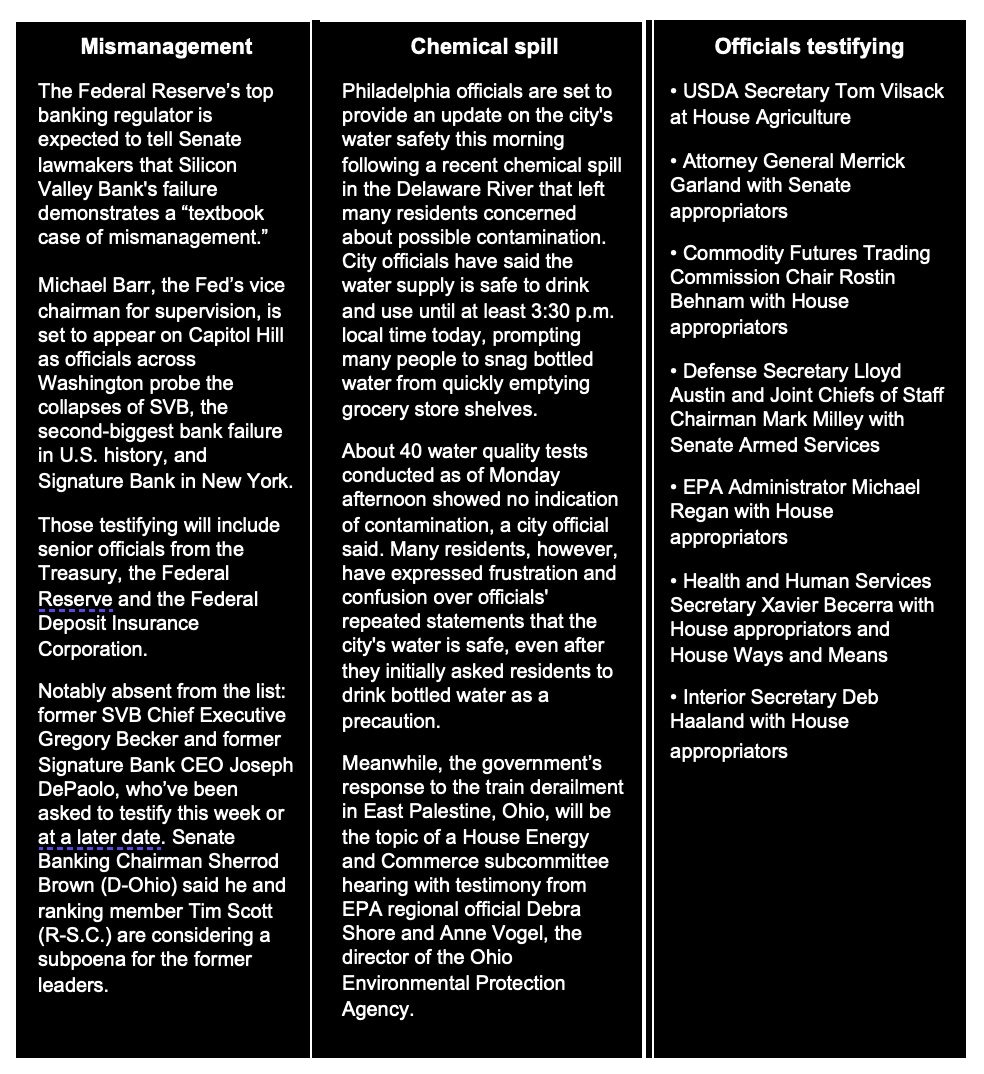
|
In Today’s Digital Newspaper |
USDA daily export sale: 136,000 metric tons corn to China during 2022-2023 marketing year.
Wall Street is warming up to banks. Bond yields are moving higher with the 2-Yr Note yield notably trading above 4% as banking fears continue to ease although markets remain on edge. The situation in the banking sector is fluid, and investors broadly remain on edge, but many challenge the notion that there is any fundamental, widespread problem on the asset side of bank balance sheets. On Monday, First Citizens’ share price rose 54% after it reached a deal to buy large parts of SVB, and shares of U.S. regional banks also rallied; First Republic Bank climbed 12%, PacWest Bancorp 3.5% and Western Alliance Bancorp 3%. Deutsche Bank also rose, gaining 6% after falling 8.5% Friday on contagion fears.
A large-scale transport strike brought large parts of Germany to a standstill on Monday in one of the country’s biggest walkouts in decades, part of a wave of labor unrest sparked by higher prices in Europe. Most air, train and public transport systems ground to a halt across the country after workers joined a 24-hour walkout aimed at securing inflation-beating wage rises.
The U.S. and Japan agreed a trade deal on electric-vehicle battery minerals, part of an attempt to counter China’s dominance in the industry. Under the agreement, electric vehicles made by Japanese carmakers will likely get wider access to new tax breaks in America. The deal prohibits the two countries from introducing bilateral export restrictions on minerals such as lithium, nickel and cobalt.
President Joe Biden vowed to veto the House GOP energy package if it lands on his desk in its current form, as it contains measures that the White House said "would pad oil and gas company profits — already at record levels — and undercut our public health and environment." The sweeping energy package, called the Lower Energy Costs Act, includes provisions to boost oil and gas drilling on federal lands, repeal parts of the Inflation Reduction Act and expedite permitting for energy projects, although the White House said it was open to working in a bipartisan manner to address energy costs and permitting reform.
A GAO report deals with Sustainable Aviation Fuel (SAF) and is a good update on the topic. See Energy and Climate Change section.
We have several policy-related updates on several items. Check the Policy section.
Global hunger and malnutrition pose significant threats to U.S. national security, underscoring the need to invest in international agricultural research and development, according to a new report commissioned by Farm Journal Foundation. See Food section for more.
Prime Minister Benjamin Netanyahu agreed Monday evening to pause a divisive plan to overhaul Israel’s judicial system until the next parliament session after widespread unrest. As unprecedented strikes gripped Israel, Netanyahu said he was postponing voting on the judicial overhaul to allow time to reach a consensus.
|
MARKET FOCUS |
Equities today: Global stock markets were mixed overnight. U.S. Dow opened flat and then turned slightly lower before heading higher. In Asia, Japan +0.2%. Hong Kong +1.1%. China -0.2%. India -0.1%. In Europe, at midday, London +0.2%. Paris +0.3%. Frankfurt +0.2%.
U.S. equities yesterday: A recovery in bank stocks helped the Dow and S&P 500 finish higher to open the week while the Nasdaq notched a loss. The Dow was up 194.55 points, 0.60%, at 32,432.08. The S&P 500 rose 6.54 points, 0.16%, at 3,977.53. The Nasdaq declined 55.12 points, 0.47%, at 11,768.84.
Agriculture markets yesterday:
- Corn: May corn rose 5 1/4 cents to $6.48 1/4, near the session high and the highest close since Feb. 24.
- Soy complex: May soybeans rose 14 cents at $14.42 1/4 and nearer the session high. May soybean meal gained 90 cents at $446.00 and nearer the session high. May bean oil closed up 128 points at 54.55 cents and near the session high.
- Wheat: May SRW futures closed 9 1/2 cents higher at $6.98, in the upper-third of today’s range. May HRW futures closed 12 1/4 cents higher at $8.60 1/4 after rejecting off the 100-day moving average. Spring wheat futures closed 16 cents higher at $8.73 1/2.
- Cotton: May cotton futures closed 298 points higher at 79.52 cents after spending most of the afternoon limit up.
- Cattle: April live cattle rose $1.90 to $164.90, near the session high and hit a nearly three-week high. May feeder cattle gained $3.825 at $201.375 and closed nearer the session high.
- Hogs: April lean hogs rose $1.45 to $78.625, above initial resistance of $77.925.
Ag markets today: Soybeans extended Monday’s strong gains overnight, while corn modestly pulled back and wheat traded narrowly on both sides of unchanged. As of 7:30 a.m. ET, corn futures are trading around a penny lower, soybeans were 6 to 7 cents higher and wheat futures were a penny lower to 2 cents higher. Front-month crude oil futures were modestly firmer, and the U.S. dollar index was down more than 250 points.
Technical viewpoints from Jim Wyckoff:
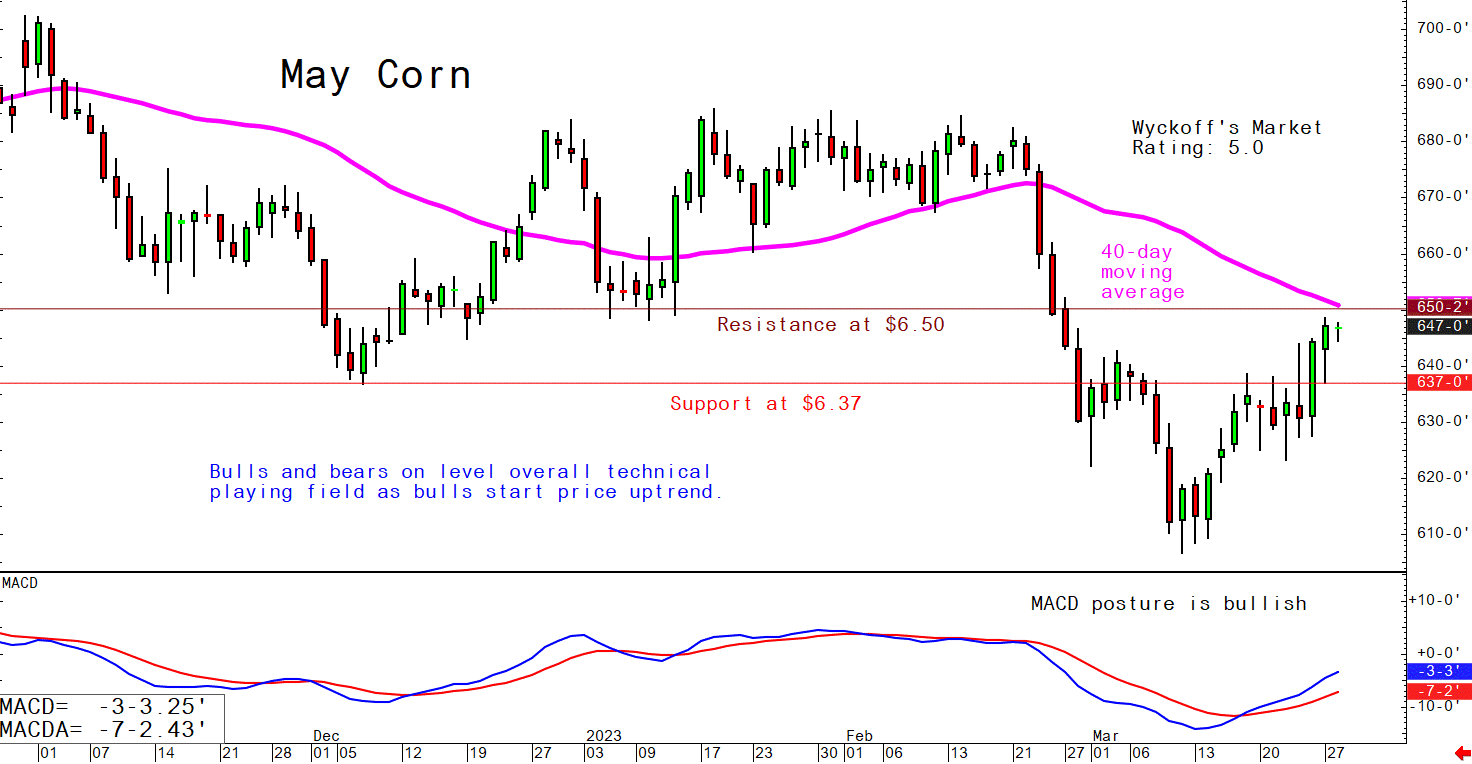
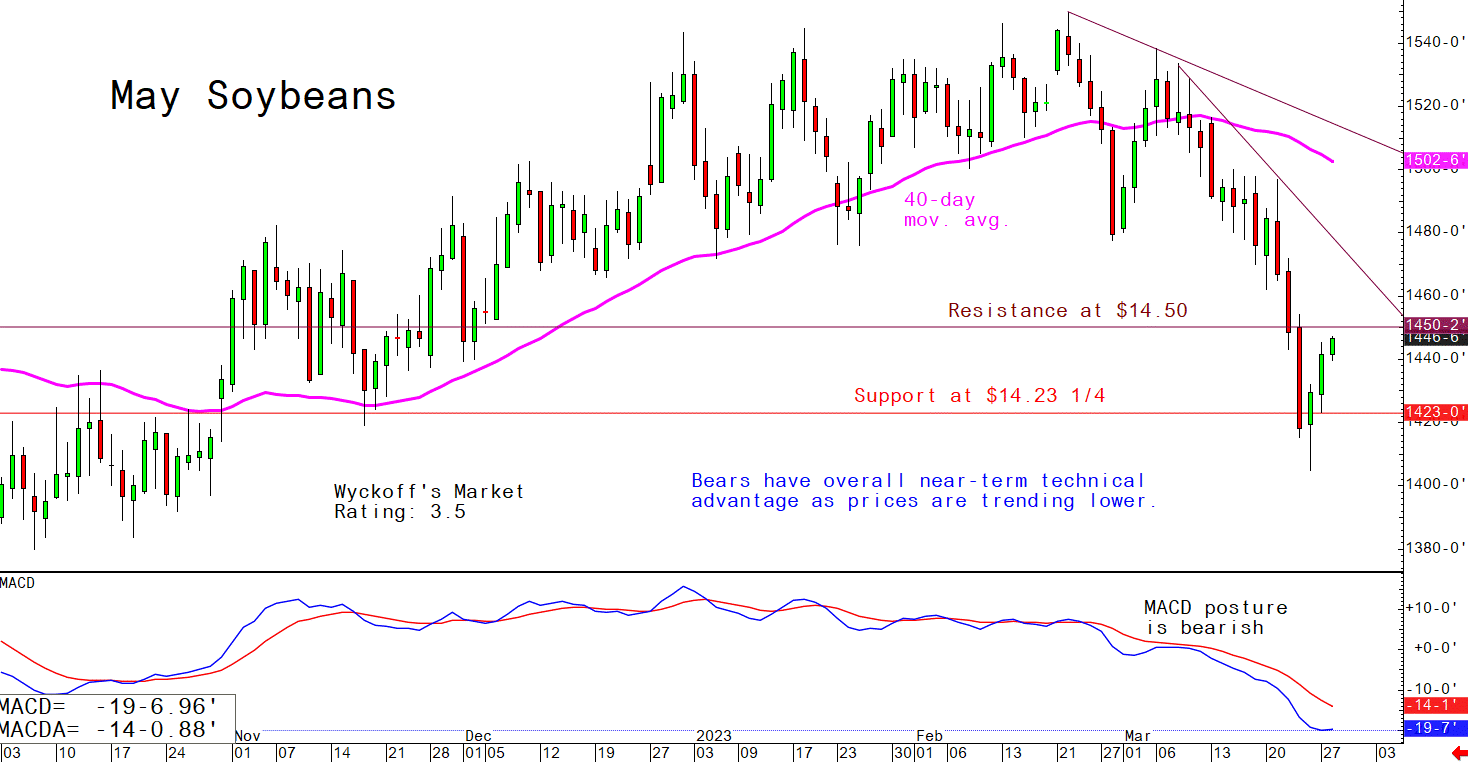
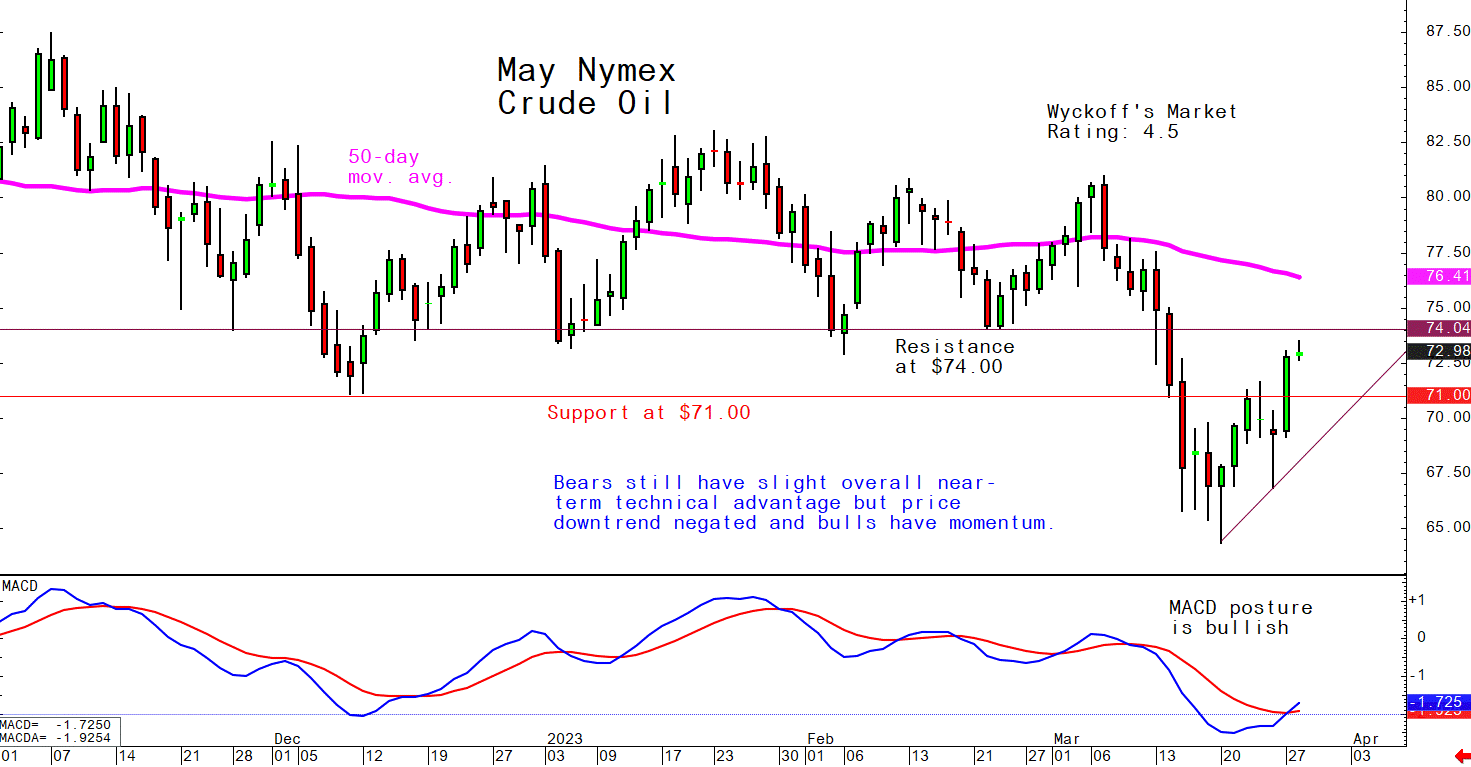
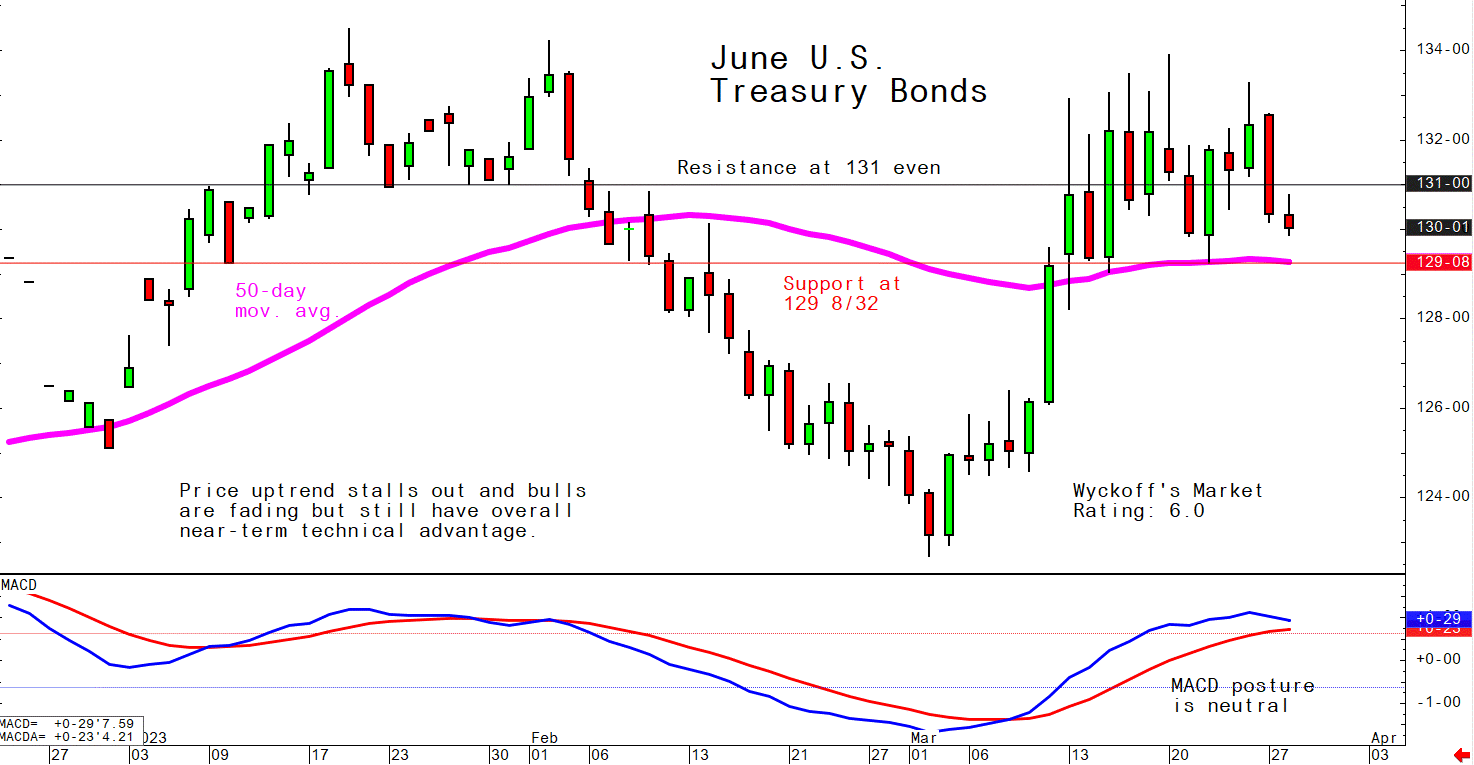
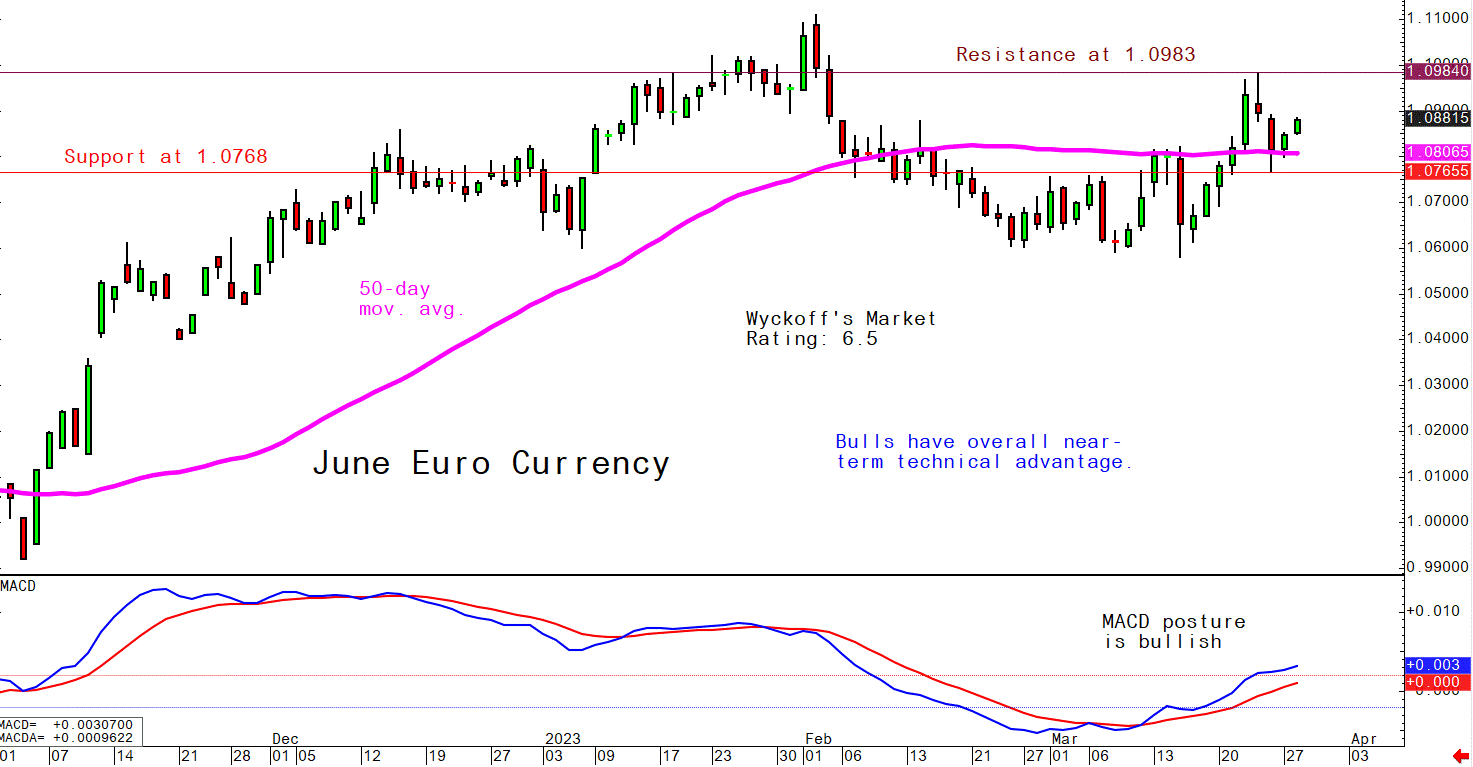

On tap today:
• U.S. advance economic indicators for February are out at 8:30 a.m. ET.
• S&P CoreLogic Case-Shiller's 20-city home-price index for January is expected to rise 2.7% from one year earlier. (9 a.m. ET)
• Richmond Fed's manufacturing survey is expected to rise to minus 10 in March from minus 16 one month earlier. (10 a.m. ET)
• Conference Board's consumer confidence index is expected to fall to 100.7 in March from 102.9 one month earlier. (10 a.m. ET)
• Bank collapse: Federal Reserve Vice Chair Michael Barr, Federal Deposit Insurance Corp. Chair Martin Gruenberg and Treasury Undersecretary Nellie Liang appear before a Senate panel to discuss Silicon Valley Bank's collapse at 10 a.m. ET.
The U.S. trade deficit in goods widened slightly to $91.63 billion in February 2023 from a revised $91.09 billion in the previous month, amid a weakening global demand due to a rising cost of living and higher borrowing costs, an advance estimate showed. Exports were down 3.8% due to declines in sales of vehicles (-11.9%), consumer goods (-4.6%), industrial supplies (-4.2%) and capital goods (-2.5%). Meanwhile, imports fell at a slower 2.3% on lower purchases of vehicles (-7.1%), consumer goods (-5.6%) and foods, feeds & beverages
(-3.4%).
Wholesale inventories in the U.S. increased 0.2% month-over-month in February of 2023, rebounding from an upwardly revised 0.5% drop in January, preliminary estimates showed. Inventories were up 0.6% for durables, after a 0.2% drop while those for nondurables decreased 0.4%, following a 1.1% decline in January. Compared to a year earlier, wholesale inventories jumped 12.2%.
The global economy's prospects are getting dimmer. A new report from the World Bank (link) says that declining growth in productivity, investment and the labor force are combining to lower the potential pace at which the economy can expand without sparking excessive inflation. Potential gross domestic product growth is expected to fall to 2.2% by 2030, the slowest in three decades and well below the 3.5% pace at the start of the century and 2.6% in the decade preceding the Covid-19 pandemic. "The result could be a lost decade in the making — not just for some countries or regions as has occurred in the past — but for the whole world," World Bank President David Malpass said.
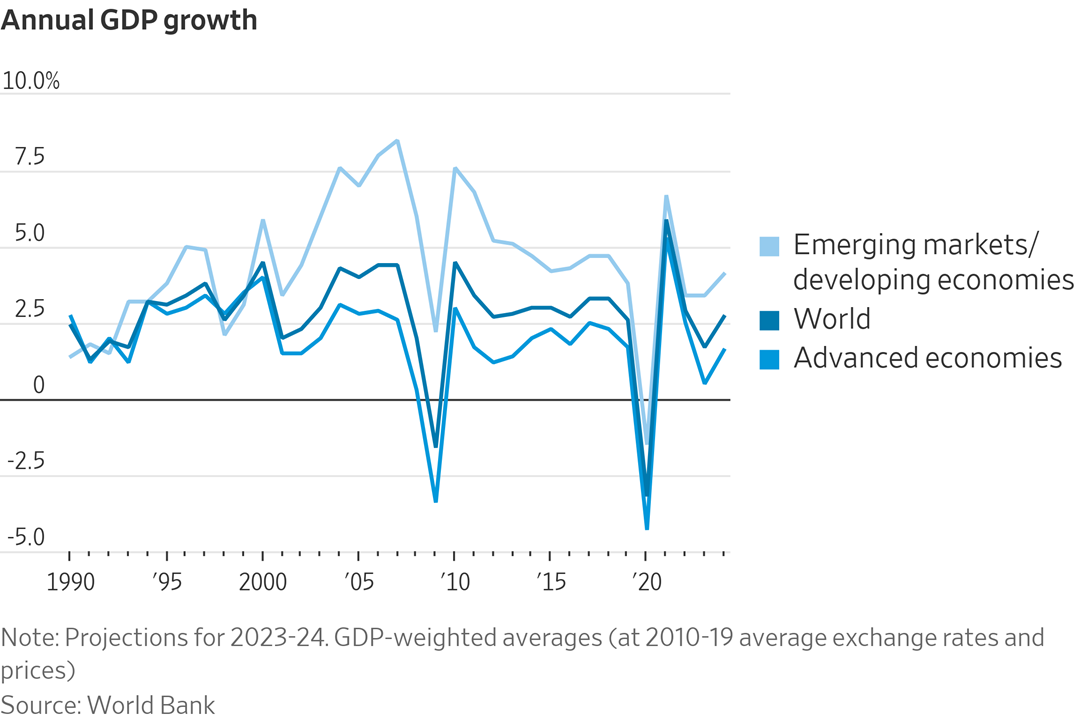
Disney is making major cuts to its workforce with layoffs set to impact about 7,000 jobs beginning this week, CEO Bob Iger said Monday. In a memo to staff, Iger said the layoffs will come in waves stretching into the summer. The cuts to Disney's global workforce are part of a multibillion-dollar cost-cutting initiative aimed at streamlining the company's operations. A cut of 7,000 jobs represents about 3% of its global workforce of about 220,000 employees.
Childless in Japan. Alarmed by an accelerating slide in the number of babies born in Japan, Prime Minister Fumio Kishida is preparing a package that he says is a last chance to keep society functioning. Compulsory paternity leave, canceling student debt for parents and big payouts for a third child are among ideas being considered, as the government lays out a path to double spending on measures by June.
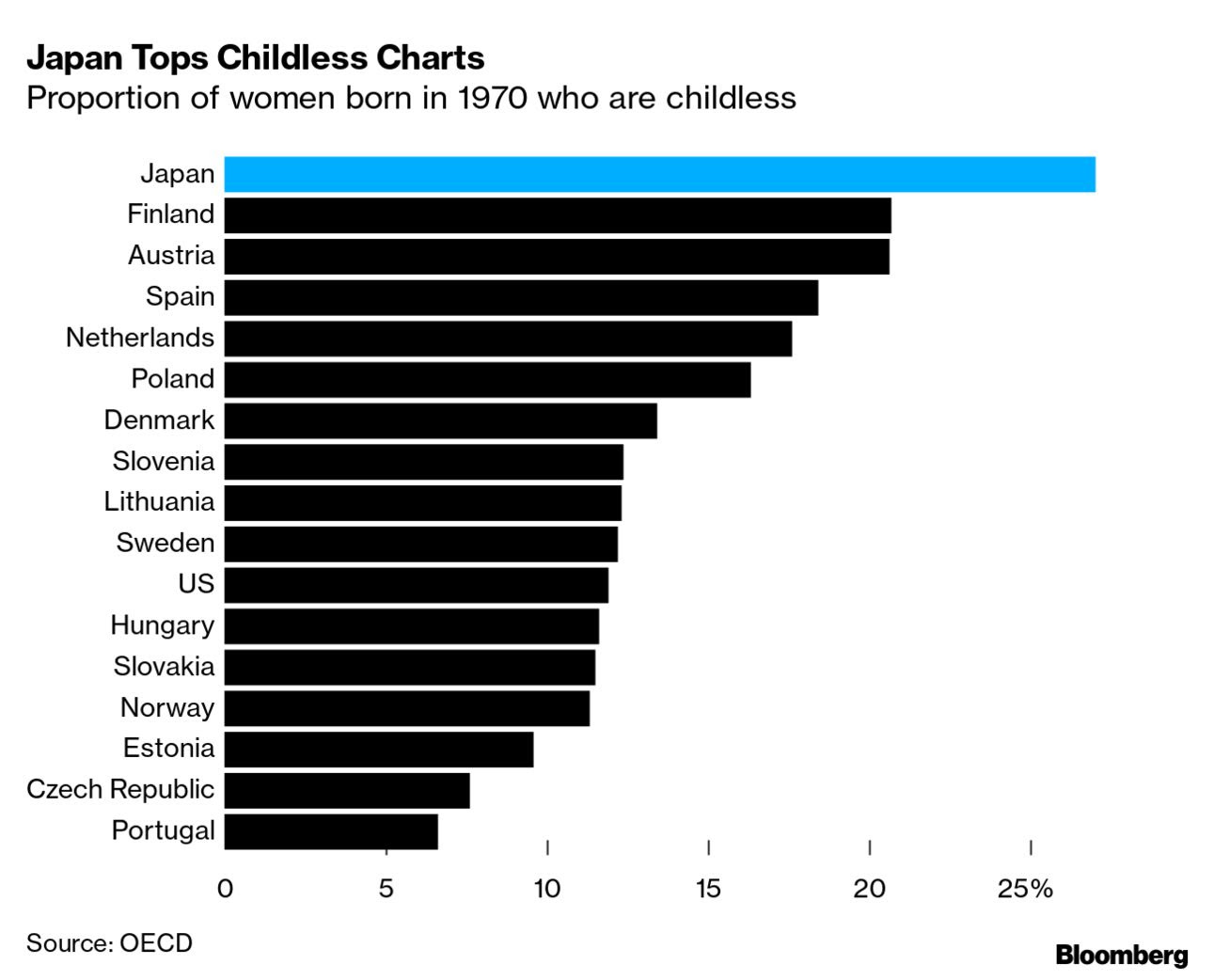
A massive strike hit Germany Monday, with workers demanding pay raises in the midst of high inflation. Union bosses called the demanded increases “a matter of survival,” while management described the strikes as “completely excessive.” Germany’s transport network was effectively frozen for the day. Staff at airports, bus terminals, ports, and railways walked out. Flights at eight major airports were impacted. The German Airports Association estimated about 380,000 travelers would have their flights grounded as a result. Local media dubbed it “mega strike.”
ESG investing has gained some traction, but support varies by state, according to an assessment. Some investors note the potential benefits of considering environmental, social, and governance factors in their decision-making process. However, the concerns listed below are some reasons why certain Republicans or conservative-leaning individuals might oppose or question the value of ESG investing.
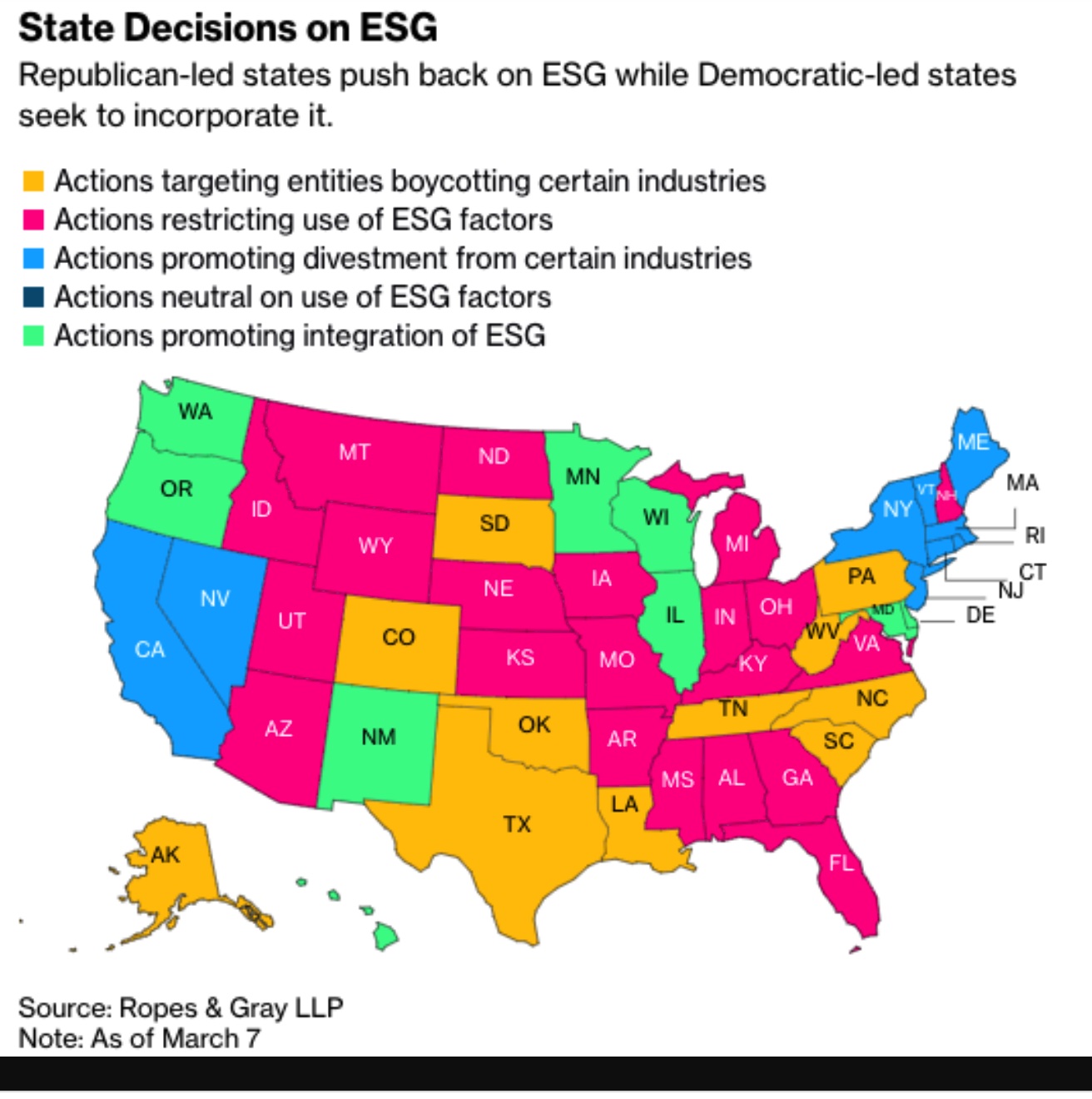
ESG stands for Environmental, Social, and Governance, and it refers to a set of criteria used to evaluate a company's performance and impact in these three areas. ESG factors are increasingly considered by investors, asset managers, and other stakeholders to assess the sustainability and ethical practices of businesses. Incorporating ESG principles into investment strategies and decision-making processes can help identify potential risks and opportunities that may not be captured by traditional financial analysis.
- Environmental criteria assess how a company manages its impact on the environment, including factors such as climate change, resource management, pollution, and waste management.
- Social criteria evaluate a company's relationships with its employees, customers, suppliers, and communities. This can include issues such as labor practices, diversity and inclusion, human rights, and consumer protection.
- Governance criteria focus on the way a company is governed and managed, encompassing topics like board diversity, executive compensation, anti-corruption policies, and shareholder rights.
- Companies with strong ESG performance are often viewed as more sustainable, responsible, and better equipped to handle long-term risks, which can make them more attractive to investors.
Some Republicans and conservative-leaning individuals oppose ESG investing for a variety of reasons. Common concerns include:
- Political bias: Critics argue that ESG factors can introduce political biases into investment decisions, favoring companies and industries that align with certain political or social viewpoints. They worry that this may lead to the exclusion of certain sectors, such as fossil fuels, which might be seen as less sustainable or ethical.
- Focus on financial returns: Some Republicans believe that the primary goal of investing should be to maximize financial returns, rather than promoting social or environmental causes. They argue that incorporating ESG factors might detract from this objective, potentially leading to lower returns for investors.
- Overregulation: Some critics are concerned that ESG investing could lead to excessive government intervention and regulation, which they believe might stifle innovation, reduce efficiency, and limit economic growth.
- Lack of standardized metrics: The absence of universally accepted and consistent ESG metrics can make it difficult to compare companies or industries, leading to concerns about the accuracy and reliability of ESG ratings. Some Republicans argue that this lack of standardization could lead to misleading or inconsistent evaluations of corporate performance.
- Potential for greenwashing: Critics worry that companies might engage in "greenwashing," where they exaggerate or misrepresent their environmental and social performance to attract investment or improve their public image. This concern raises questions about the effectiveness of ESG investing in promoting truly sustainable and responsible business practices.
Market perspectives:
• Outside markets: The U.S. dollar index was weaker, with the euro and British pound stronger against the greenback. The yield on the 10-year U.S. Treasury note was higher, trading around 3.55%, with a higher tone in most global government bond yields. Crude oil futures have swung to slight gains, with U.S. crude around $73.00 per barrel and Brent around $77.80 per barrel. Both WTI and Brent crude registered strong gains Monday. Gold and silver are higher ahead of US trading, with gold around $1,961 per troy ounce and silver around $23.27 per troy ounce.
• Ag trade: Turkey provisionally bought 535,000 MT of milling wheat with more purchases expected in the tender for up to 695,000 MT.
• NWS weather outlook: Powerful storm system brings more heavy rainfall/mountain snow to the West with cooling temperatures... ...Heavy rain with the potential for flash flooding continues in the Southeast Tuesday... ...Chance for light snow over the Interior Northeast and Great Lakes; temperatures remain very chilly in the Northern Plains.

Items in Pro Farmer's First Thing Today include:
• Quiet grain price action overnight
• HRW conditions modestly improve during March but still historically low
• Consultant keeps South American crop estimates unchanged
• Poland, Romania want EU to trace Ukrainian grain exports (details below)
• Indonesia’s CPO export tax and levy to remain unchanged
• Higher cash cattle expectations
• April hogs now premium to cash index
|
RUSSIA/UKRAINE |
— U.S. intelligence: Ukraine has the most land mines throughout their country, and especially in key agriculture regions. That means the country will increasingly become dependent on some imports and humanitarian aid ahead. And Ukraine will no longer be the “breadbasket of Europe.” Other countries will have to seek imports elsewhere.
Perspective: Russian leader Vladimir Putin’s plan all along has been to reduce grain production and exports in Ukraine and boost them in his country
— China/Russia collaboration. A Russian distributor is importing fibers and other items from China to manufacture body armor, including armored vests that have previously ended up on the battlefield in Ukraine, according to trade and customs data obtained by Politico. Some of those vests have been used by Russian troops in Ukraine, according to photos and videos posted online, and Ukrainians who are selling on eBay the vests they say they took from the battlefield. Link for details.
— Volodymyr Zelenskyy, Ukraine’s president, accused Russia of “radiation blackmail” over its occupation of the Zaporizhia nuclear plant, Europe’s largest. Zelenskyy claimed that Russian occupiers of the plant were failing to uphold safety rules. “Holding a nuclear power plant hostage…This is surely the worst thing that has ever happened in the history of European or worldwide nuclear power,” said Zelenskyy.
— Poland, Romania want EU to trace Ukrainian grain exports. Romania and Poland are in talks with the European Commission over export tracing mechanisms for Ukrainian grains to ensure local farmers are not hurt by a flood of cheap imports. Large quantities of Ukrainian grains, which are cheaper than those produced in the European Union, have ended up in central European states, hurting prices and sales of local farmers.
— Russia is helping Iran gain advanced digital-surveillance capabilities as their military cooperation grows.
|
POLICY UPDATE |
— Only four drivers recently enrolled in the new apprentice pilot program to allow people as young as 18 to drive trucks across state lines — even though the plan can accommodate as many as 3,000. The 2021 infrastructure law included a provision that would allow drivers younger than 21 to drive in interstate commerce through a pilot apprenticeship program, an idea designed to help keep the supply chain moving. But the law also required carriers to join a Labor Department apprenticeship program. Republicans are frustrated by the lack of recruits, writing that the Department of Transportation created “unnecessary requirements” that were “designed to doom” the program in a letter to the head of the Federal Motor Carrier Safety Administration.
— Total ERP Phase 1 payments edge higher. Payments under Phase 1 of USDA’s Emergency Relief Program (ERP) totaled $7.42 billion as of March 26, up slightly from $7.41 billion the prior week. Payments for non-specialty crops were steady at $6.29 billion and specialty crop payouts were also steady at $1.13 billion.
There are now 10 applications approved for ERP Phase 2 payments totaling $17,302.
Payments under the Coronavirus Food Assistance Program (CFAP) efforts were steady with the prior week.
— USDA announces second installment of debt relief. USDA announced another $123 million in payments will be made in April under the Inflation Reduction Act (IRA) to provide debt relief for borrowers. Focus for the second round of payments is on those who were past due on a qualifying direct loan as of Sept. 30, 2020, but by fewer than 60 days and are still delinquent; those who restructured a qualifying loan after Feb. 28, 2020, through primary loan servicing at FSA; and those who owe more interest on a direct loan than the level of principal owed.
The agency is still working on the payments that are to go to farmers who suffered discrimination in FSA loan programs. This falls under some $3.1 billion in debt relief that was included in the IRA.
USDA in October 2022 released more than $800 million in automatic relief payments, the first tranche from the program. That money went to about 11,000 borrowers 60 days or more delinquent on Farm Service Agency loans and 2,100 borrowers who had their collateral liquidated but still owed. The agency has been paying out more complicated cases on a case-by-case basis.
|
PERSONNEL |
— Mayne to leave FDA. The director of FDA's Center for Food Safety and Applied Nutrition, Susan Mayne, will retire effective May 31 amid a reorganization intended to strengthen the agency's role in nutrition and food safety.
|
CHINA UPDATE |
— White House today begins a three-day Summit for Democracy to confront Beijing, the second such summit. The Netherlands will be the European co-host for the event, alongside South Korea, Zambia and Costa Rica. “From wars of aggression to changes in climate, societal mistrust and technological transformation, it could not be clearer that all around the world, democracy needs champions at all levels,” the White House said in a joint statement with the other hosts.
— A new study offers a look at how the PBOC wields its $3.3 trillion arsenal. A group of leading economists documented at least $240 billion in assistance that Beijing has funneled into 22 countries including Argentina, Pakistan and Nigeria since 2000. Link for details.
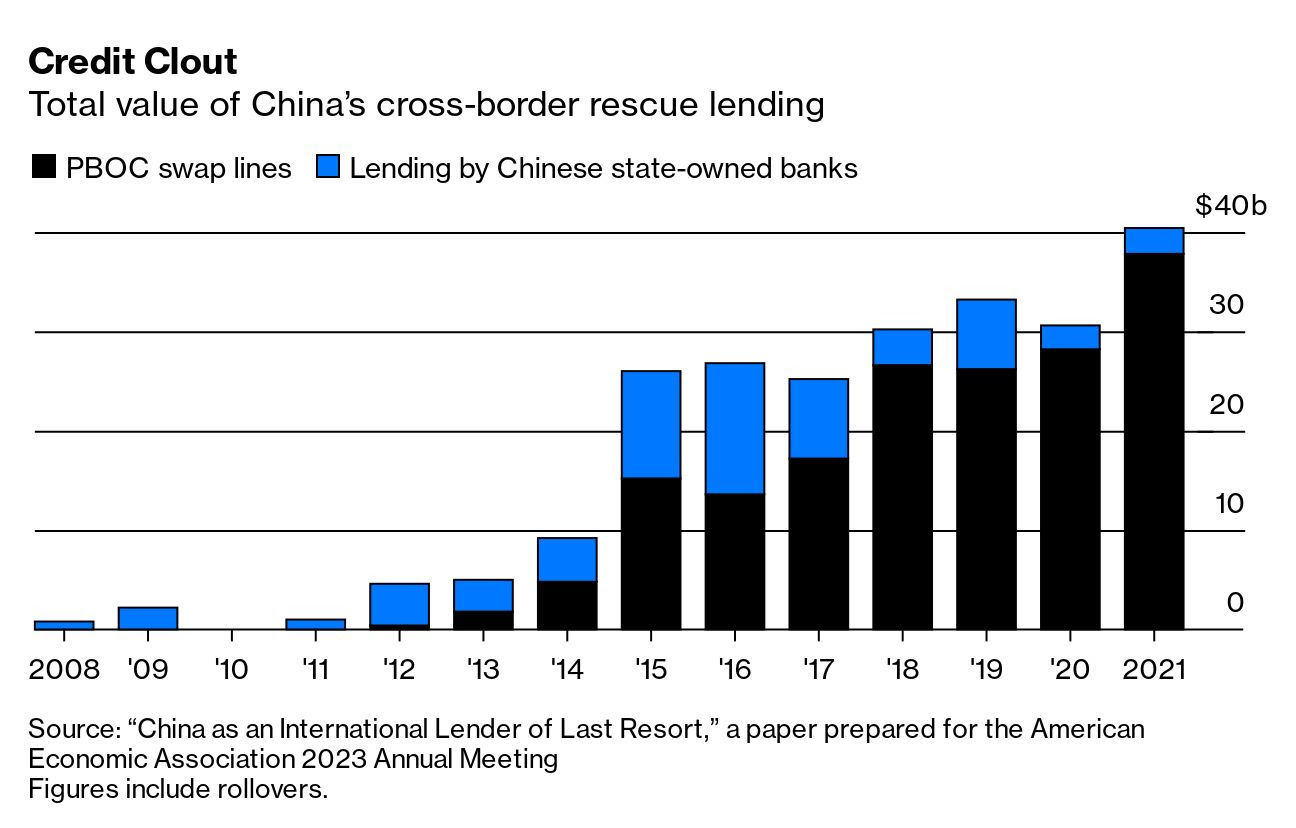
— Companies seeking Chips Act funds could have to choose between the U.S. and China. The Biden administration’s proposed rules for federal grants under the Chips Act detail restrictions that chip companies would face on operations in China and other countries of concern if the companies accept taxpayer funding. The Wall Street Journal reports (link) the restrictions would be particularly onerous for East Asian companies with significant operations in those countries. Taiwan Semiconductor Manufacturing Co., Samsung Electronics and SK Hynix are among those that have already invested billions of dollars in China. Semiconductor companies will be asked to provide financial projections as part of their grant applications.
|
ENERGY & CLIMATE CHANGE |
— U.S. and Japan reach deal on critical minerals for battery production. The agreement covers issues on minerals used to make batteries, including issues on trade and labor. The accord calls on both countries to avoid using export duties on critical minerals in exports to the other country, consult on domestic measures that address non-market policies and practices of other countries affecting trade in critical minerals and on issues relative to supply chains for critical global minerals. The two sides are to meet and confer on best practices on review of investments by foreign entities within their territories and several components linked to workers in the sector.
A key issue remains: Whether the deal would let electric vehicles (EVs) made with minerals from Japan can be eligible for certain tax credits under the Inflation Reduction Act (IRA). A senior Biden administration official cautioned that determination would be made by the U.S. Treasury. That agency is expected to unveil their eligibility rules for the EV tax credits yet this week.
— California will limit the amount of profit oil companies can earn in the state under legislation pushed by Governor Gavin Newsom to control soaring gasoline prices. California lawmakers have approved legislation to increase transparency in the oil industry, ending a special session he called last year to penalize excessive profits. The bill, SBX1-2, gives the California Energy Commission the power to set a cap and impose penalties through a regulatory process if it decides that oil companies are making excessive profits and that a penalty will not result in higher prices for consumers.
— Renewables surpassed coal power generation. More electricity was generated in the U.S. last year from renewable sources than from burning coal for the first time, according to the Energy Information Administration. Renewable energy sources, including wind, solar, hydropower and biomass, accounted for some 22% of electricity generation last year, up from about 12% a decade ago.
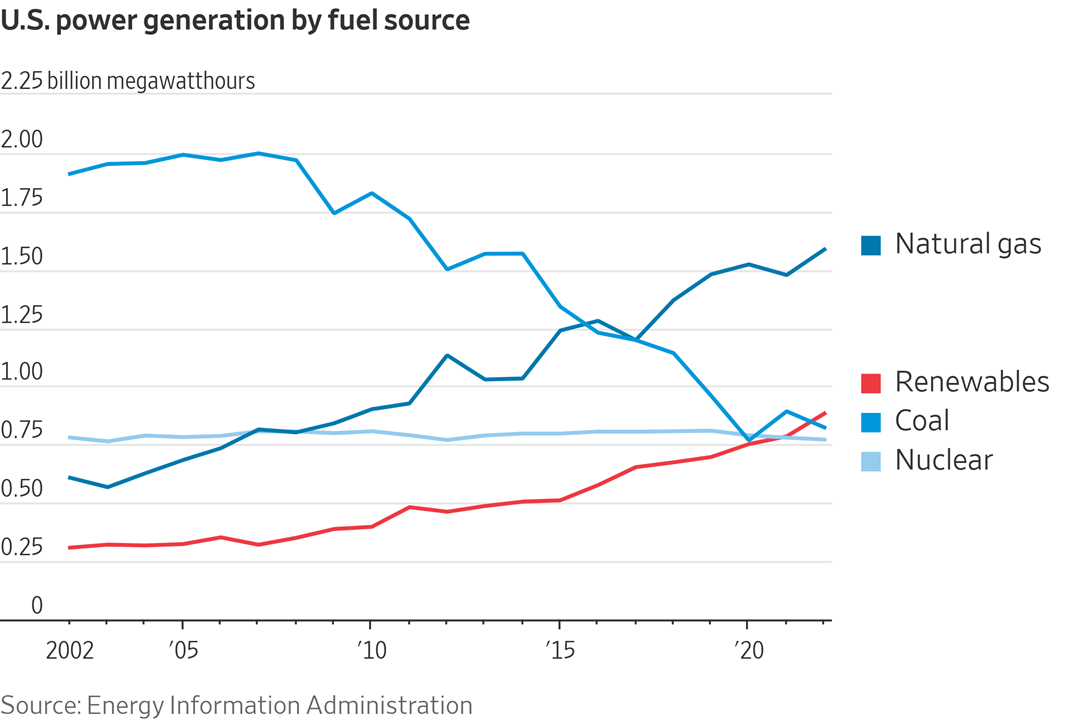
— GAO report: Departments need to improve job of measuring progress to spur production of SAF. A new Government Accountability Office report (link) says the Transportation, Energy and Agriculture Departments should do a better job of measuring the progress of their work to spur the production of 3 billion gallons of Sustainable Aviation Fuel (SAF) by 2030.
SAF is alternative jet fuel made from renewable and waste feedstocks that can reduce greenhouse gas emissions on a lifecycle basis. SAF production and use in the U.S. has increased in recent years; this fuel is now used by airlines at two major commercial airports in California. While U.S. production reached 15.8 million gallons in 2022, it accounted for less than 0.1 percent of the total jet fuel used by major U.S. airlines (see table). This also falls well below the previous Federal Aviation Administration goal for U.S. airlines to use 1 billion gallons of SAF per year by 2018.
Challenge roadmap. Transportation and Agriculture concurred. Energy indicated the recommendation is completed and that planned roadmap activities will enable progress to be measured. As discussed in the report, GAO disagrees that the recommendation is completed.
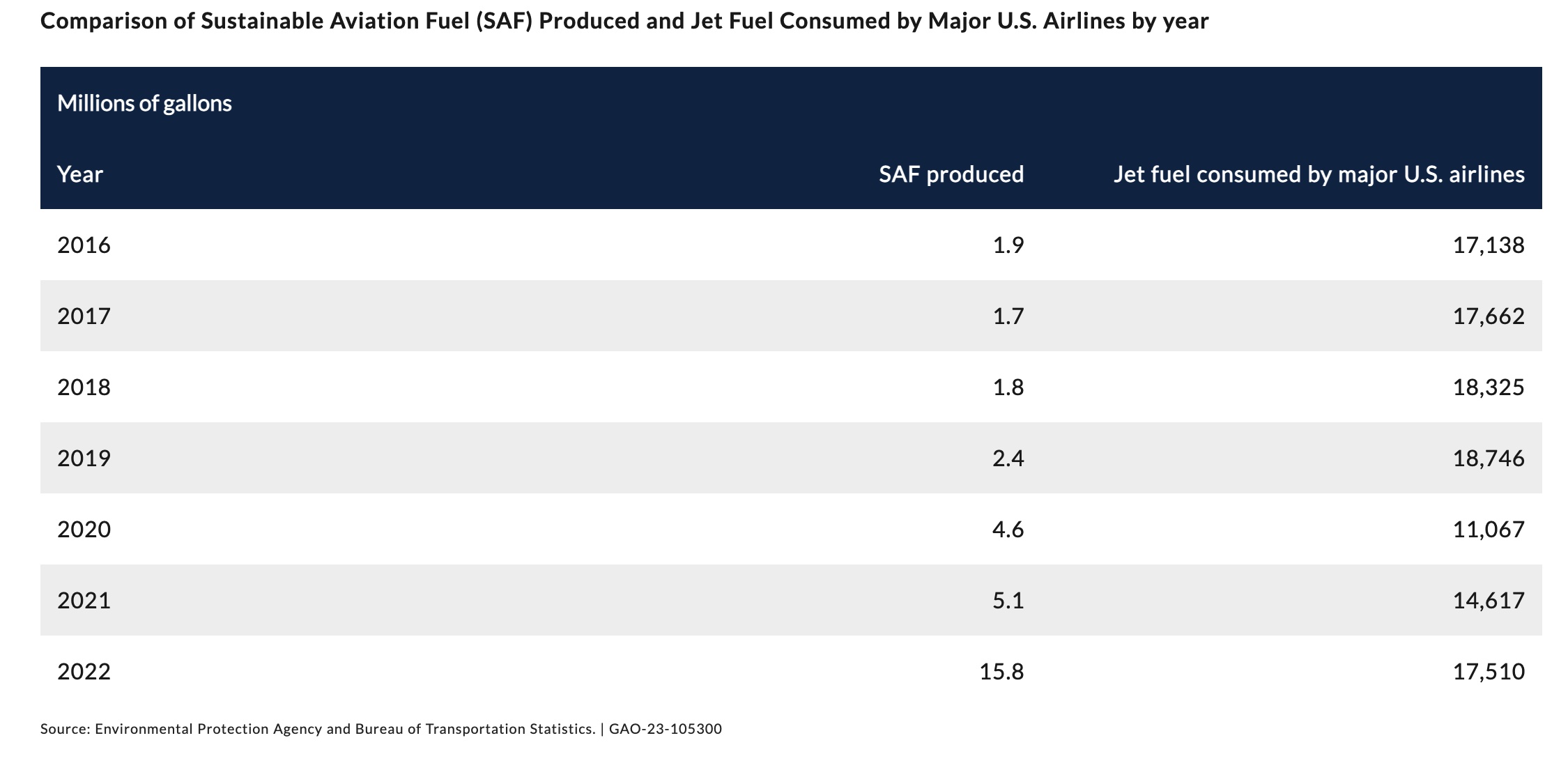
|
LIVESTOCK, FOOD & BEVERAGE INDUSTRY |
— Report: Hunger and malnutrition threaten U.S. national security. Global hunger and malnutrition pose significant threats to U.S. national security, underscoring the need to invest in international agricultural research and development, according to a new report commissioned by Farm Journal Foundation. The report, authored by researchers from Texas A&M University, examines how global food insecurity is linked to numerous geopolitical risks, including immigration, radicalization, terrorist threats, environmental degradation, and lost economic opportunity. Increasing investments in agricultural development and innovation would help mitigate these risks by enabling developing countries to improve their crop yields and better feed themselves. Link to full report. Link to executive summary.
“Agriculture is the main profession practiced by the world’s poorest people, so making investments in improving farm productivity in developing countries would go a long way toward addressing the root causes of many national security risks,” said Dr. Edwin Price, lead author of the report and professor at the Department of Agricultural Economics’ Conflict and Development Program at Texas A&M University. “Alleviating hunger and improving agricultural livelihoods means that people are less likely to immigrate, turn toward criminal activity, or fall prey to radicalized groups.”
The world has seen an alarming rise in hunger and malnutrition in the past few years due to challenges from the global pandemic, the war in Ukraine, extreme weather events linked to climate change, and other shocks. As many as 828 million people – one in ten people on the planet – are affected by hunger, according to the World Food Program.
Hunger and poverty in developing countries create five kinds of threats to U.S. national security, according to the paper. These are socio/political threats, economic threats, nutrition and health threats, environmental threats, and cultural threats.
Investing in agricultural productivity and other long-term solutions can help reduce government spending on humanitarian assistance, according to the report. Despite this, U.S. funding for agricultural research and development has been flat at about $1 billion since 2010, while U.S. humanitarian aid grew from under $4 billion in 2014 to $14 billion in 2022, according to the U.S. Agency for International Development (USAID). Agricultural research provides one of the highest returns of any public research investment, generating $20 on average for every $1 spent, according to a study by the U.S. Department of Agriculture’s Economic Research Service (ERS).
The report makes a series of recommendations for how the U.S. can invest in long-term global agricultural development. This includes increasing investments in global food and nutrition security programs, as well as research and innovation, within the government’s Feed the Future initiative, supporting funding for the Foundation for Food and Agricultural Research (FFAR) in the Farm Bill, and supporting additional programs that benefit developing countries’ agriculture.
“Hunger used as a weapon is not only happening in Ukraine, but has been happening across the continent of Africa and in developing countries for many years,” said Kelsey Barnes, Director of Government Affairs at Farm Journal Foundation and a U.S. Army National Guard veteran. “As a world leader, the U.S. has an opportunity to make long-term investments in agriculture to reduce hunger and protect national security.”
— NCBA: APHIS risk analysis is dated. “Paraguay has a history of outbreaks of foot-and-mouth disease, and we cannot jeopardize the safety of U.S. consumers and the health of our U.S. cattle herd with outdated information,” NCBA Executive Director of Government Affairs Kent Bacus said. USDA’s Animal and Plant Health Inspection Service (APHIS) is proposing to amend its regulations to allow the importation of fresh (chilled or frozen) beef from Paraguay.
APHIS: “Based on the evidence from a risk analysis, we have determined that fresh beef can safely be imported from Paraguay, provided certain conditions are met. This action would provide for the importation of fresh beef from Paraguay into the United States while continuing to protect the United States against the introduction of foot-and-mouth disease.”
Comments are due by May 26.
— USDA considering petition on ‘free range,’ ‘pasture-raised’ claims for meat, poultry. USDA’s Food Safety and Inspection Service (FSIS) is considering a petition from Perdue Farms that the agency “conduct rulemaking to define separate ‘free range’ and ‘pasture raised’ claims for meat and poultry products,” the agency said March 27.
Perdue is also asking FSIS to update guidance on claims related to living/raising conditions to ensure that they align with consumer expectations.
The company submitted the petition March 16 which specifically calls on FSIS to “promulgate labeling regulations under the Poultry Products Inspection Act (PPIA) that remove ‘pasture-raised’ from claims considered synonymous with ‘free range’ and further amends its current Compliance Guideline such that ‘pasture-raised’ is separately and specifically defined,” according to the petition. Perdue argues that the two phrases need to have separate definitions as there is “substantial confusion” relative to what constitutes pasture raised. The company based their petition on consumer research which they detailed in their petition for the rulemaking request.
— Japan lifts BSE-linked ban on Canadian beef that was in place since 2003 linked to BSE, the Canadian Agriculture Ministry said Monday. The deal lifts age limits on Canadian beef that can be shipped to Japan and removes restrictions on processed items like beef patties. Canada still exported $379.29 million in beef to Japan in 2022 despite the restrictions, making it the second largest export destination for Canadian beef.
— An Australian company produced a woolly mammoth meatball to demonstrate the potential of lab-grown meat. The team used a mixture of mammoth and elephant DNA. (They originally wanted to make a dodo dish, but the necessary DNA sequences do not exist.) No one has yet eaten the prehistoric meatball, but the taste would be hard to verify: mammoths went extinct 4,000 years ago.
|
HEALTH UPDATE |
— Congress wants to crack down on a veterinary tranquilizer that is worsening the fentanyl crisis. The Senate and House bills that are set to be introduced today would make xylazine a Schedule III drug, a category that includes ketamine, an approved anesthetic for people and animals, and anabolic steroids. Drug dealers have been adding xylazine to the fentanyl supply, with disparate and dangerous consequences. Members of the bipartisan group of lawmakers backing the bills said the designation will make it easier to pursue xylazine traffickers and ensure the drug is being used in animals, not humans.
— Former FDA official to testify today. Frank Yiannas, the former deputy commissioner for food policy and response at FDA, will testify before the House Oversight Committee as it investigates the baby formula crisis. Yiannas departed in February and criticized the FDA’s food division. He will tell lawmakers today that the U.S. is one “outbreak, tornado, flood, or cyber-attack away” from another major infant formula shortage, according to his prepared testimony. He will also tell lawmakers the FDA’s “siloed” food programs exacerbated the crisis, and that the agency was not prepared to understand or calculate what a massive recall would do to the country’s supply of formula.
— 40 states that have expanded Medicaid, stemming from the Affordable Care Act’s passage more than a decade ago, now that North Carolina Democratic Gov. Roy Cooper signed the expansion into law on Monday.
|
CONGRESS |
— CFTC chair testifies. CFTC Chair Rostin Benham is scheduled to testify on his agency’s fiscal year 2024 budget request before the House Appropriations Agriculture-FDA Subcommittee today.
— EPA Administrator Michael Regan heads back to the Hill today to justify the administration’s fiscal year 2024 budget request, this time before House appropriators. Republicans are expected to grill him aggressively on why the agency needs a 19% funding boost, as laid out in President Joe Biden’s budget request. Last week, Regan told the Senate Environment and Public Works Committee that the White House’s $12 billion budget request is needed to address longstanding problems like crumbling wastewater infrastructure and historical pollution in neglected communities. Also, EPA’s controversial action on a new Waters of the U.S. (WOTUS) ahead of a coming Supreme Court decision on the matter will also be raised during the hearing.
— Interior Secretary Deb Haaland will face a House Appropriations subcommittee today and a Senate Appropriations subcommittee Wednesday morning to promote the department’s $18.8 billion budget request for fiscal year (FY) 2024. Republicans are expected to question Haaland on oil and gas leasing and other public lands issues. The Interior Department’s budget request represents a 9.3% increase over FY 2023, including $5.7 billion for climate adaptation and resilience measures across the department.
— Senate to consider WOTUS measure. The Senate will vote Wednesday on a measure blocking the Biden administration’s new rule defining water subject to certain environmental regulations (SJRes. 7). “I think we’re going to be successful,” sponsor Sen. Shelley Moore Capito (R-W.Va.) said. But President Biden has already indicated he will veto the measure if it gets to him. It has already cleared the House.
|
OTHER ITEMS OF NOTE |
— Kim Jong Un said North Korea is ready to use nuclear weapons “anytime and anywhere,” delivering a new threat as a U.S. aircraft carrier group arrives in South Korea.
— Israeli Prime Minister Benjamin Netanyahu shelved a judicial-overhaul plan after mass protests and strikes. The pullback was welcomed by some opposition leaders, who said they were ready to negotiate, and the country’s largest labor union called off a nationwide strike that had grounded flights, closed banks and government offices and left hospitals working with skeleton crews. If a final compromise is not reached, political analysts warn the conflict could re-emerge or even escalate.
|
KEY LINKS |
WASDE | Crop Production | USDA weekly reports | Crop Progress | Food prices | Farm income | Export Sales weekly | ERP dashboard | California phase-out of gas-powered vehicles | RFS | IRA: Biofuels | IRA: Ag | Student loan forgiveness | Russia/Ukraine war, lessons learned | Russia/Ukraine war timeline | Election predictions: Split-ticket | Congress to-do list | SCOTUS on WOTUS | SCOTUS on Prop 12 | New farm bill primer | China outlook | Omnibus spending package | Gov’t payments to farmers by program | Farmer working capital | USDA ag outlook forum |






